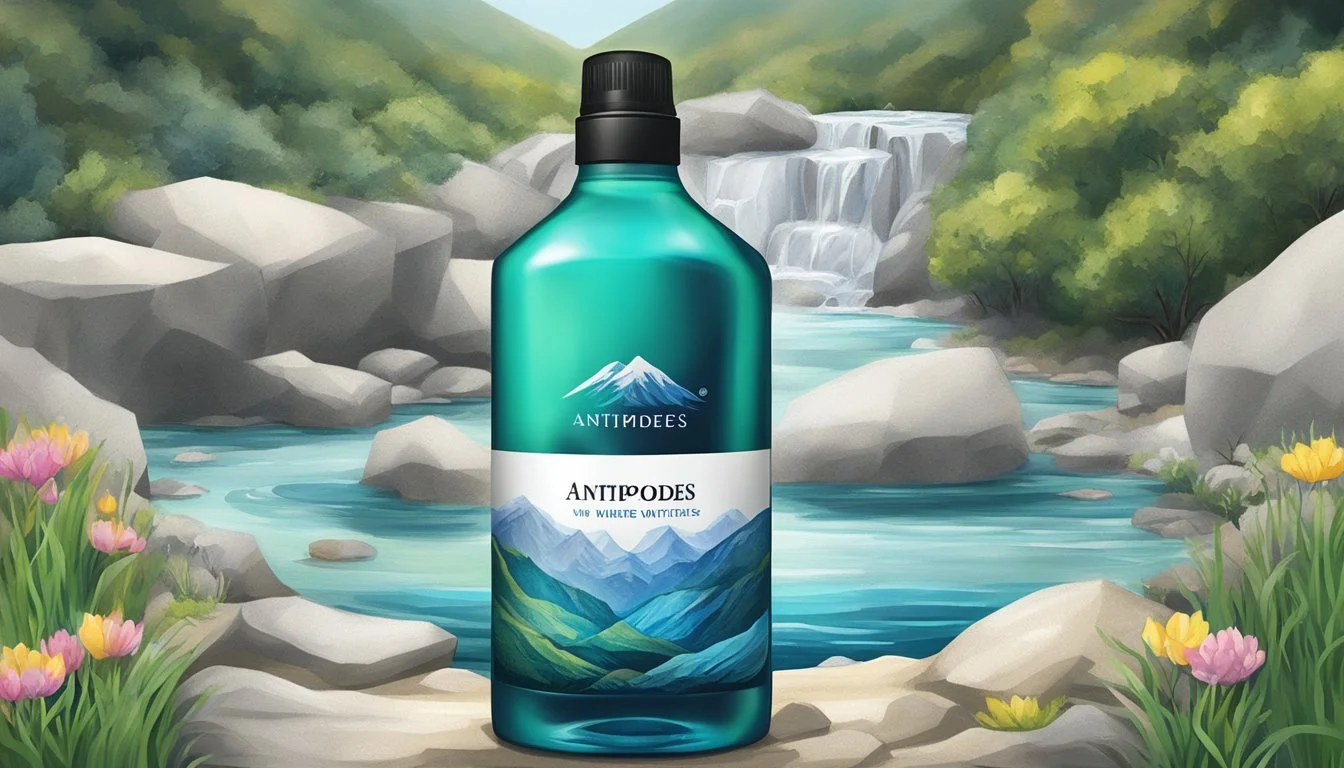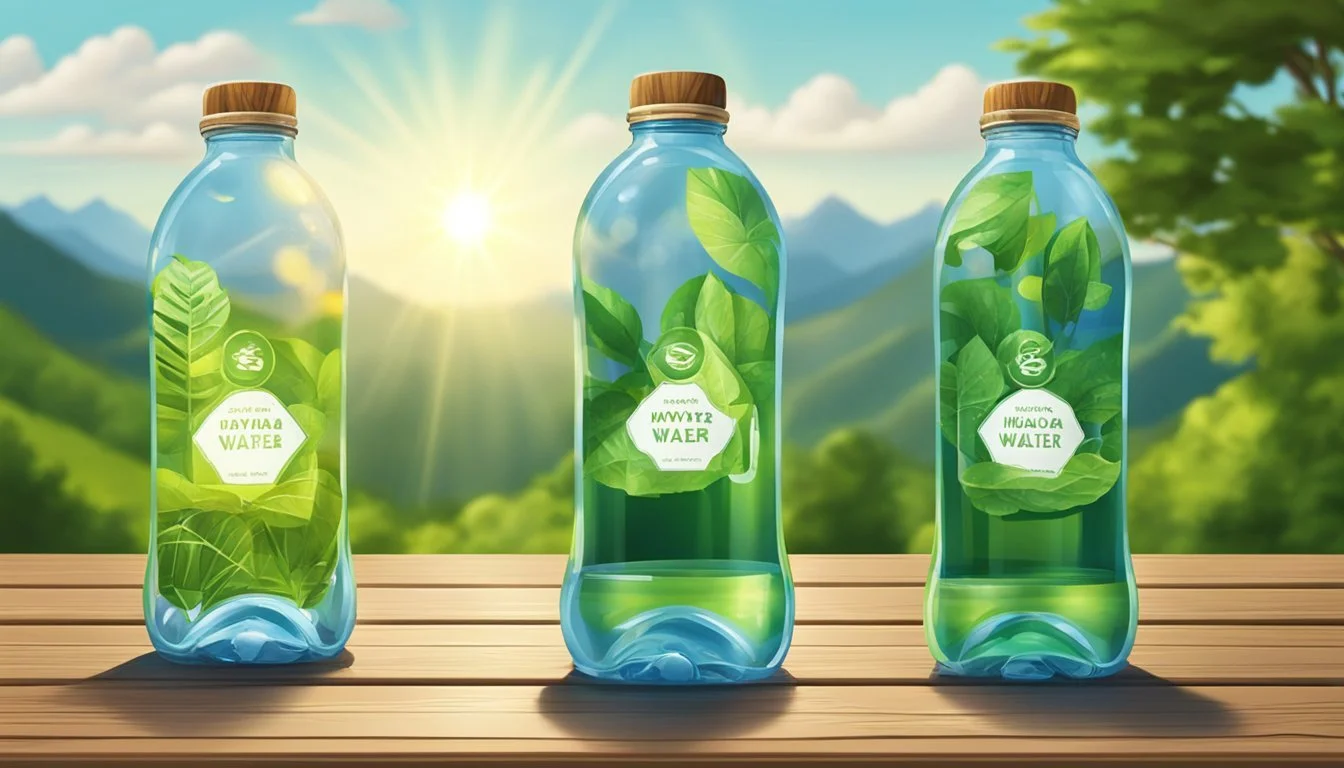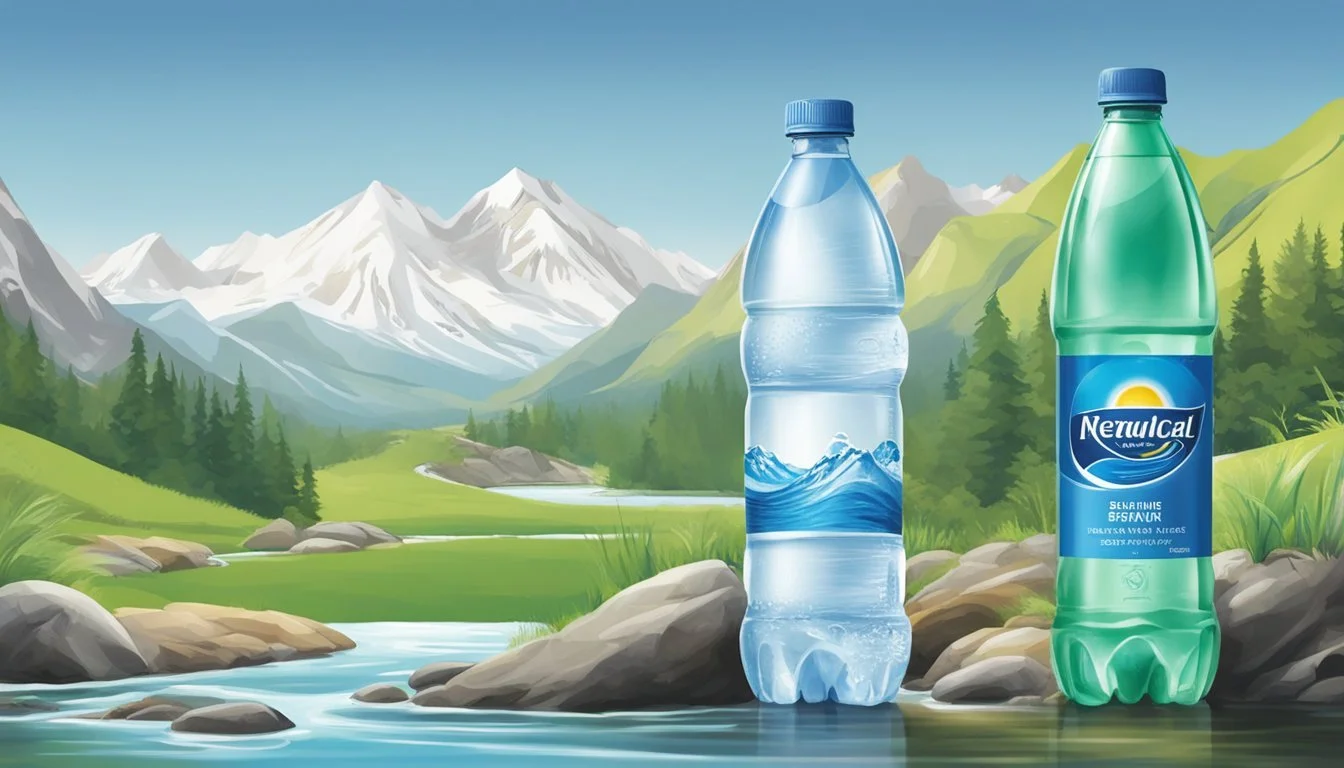Mountain Valley Spring Water vs. Antipodes
Which Bottled Water Reigns Supreme?
Choosing the right bottled water can be a quest for purity, taste, and a balance of essential minerals. For many, the decision narrows down to two premium choices: Mountain Valley Spring Water and Antipodes. Mountain Valley Spring Water takes top marks for its balanced mineral content and crisp taste, making it many Americans' go-to option since 1871.
Antipodes, on the other hand, is revered for its purity and minimalistic design, drawing from deep aquifers in New Zealand. This brand promises an almost untouched, pristine drinking experience. Readers will want to explore how these two brands stack up against each other when it comes to taste, source, and health benefits.
This article dives into the details, exploring how Mountain Valley's historic reputation and mineral-rich profile compare to the fresh, unadulterated appeal of Antipodes.
Overview of Bottled Water
Bottled water has become a popular choice for hydration due to its convenience and perceived health benefits. Various water brands offer diverse options catering to different preferences and needs.
Types of Bottled Water:
Spring Water: Sourced from natural springs, often containing minerals beneficial to health.
Mineral Water: Contains dissolved minerals and is bottled at the source.
Purified Water: Treated to remove chemicals and impurities, often through reverse osmosis or distillation.
Health Benefits
Bottled water is often marketed for its health benefits. It provides essential hydration, which is crucial for bodily functions such as temperature regulation and joint lubrication. Mineral content in some bottled waters adds nutritional value, providing minerals like calcium and magnesium.
Popular Brands
Mountain Valley Spring Water: Known for its balanced pH, mineral content, and long history since 1871.
Antipodes: Renowned for its purity and sourced from deep aquifers in New Zealand.
Comparing these brands often focuses on taste, mineral content, and bottling process. Mountain Valley is noted for its balanced pH and smooth taste, while Antipodes emphasizes a clean and crisp profile.
Packaging and Environmental Impact
Many consumers consider the environmental impact of bottled water. Brands are increasingly using recyclable materials and sustainable practices to reduce their ecological footprint. Consumers are encouraged to recycle and choose brands that prioritize sustainability.
By choosing bottled water, individuals can ensure they have access to clean and portable hydration anytime, anywhere.
Defining Mountain Valley Spring Water and Antipodes
Mountain Valley Spring Water and Antipodes both offer unique characteristics, stemming from their distinct origins and sources. These factors contribute to their distinctive qualities, making each brand stand out in the market.
Origin and Source
Mountain Valley Spring Water is sourced from a spring in the Ouachita Mountains of Arkansas. The water has been bottled in glass since 1871, reflecting a long commitment to preserving its purity at the original source. This spring water has been favored by many historical figures and continues to be recognized for its natural, premium quality.
Antipodes originates from an artesian aquifer in the Bay of Plenty in New Zealand. It's bottled a several-hundred-year-old aquifer, ensuring extremely pure natural spring water. Known for its environmental sustainability efforts, Antipodes has received acclaim for clean and pristine water with a focus on low environmental impact.
Distinctive Qualities
Mountain Valley Spring Water boasts a balanced alkalinity, characterized by its slightly alkaline pH, higher than typical tap water. The natural minerals present in the water give it a velvety texture and subtle sweetness, making it a popular choice in various grocery stores.
Antipodes, on the other hand, prides itself on its exceptionally low mineral content and neutral pH. It is often chosen for its crisp and clean taste, embodying purity. Antipodes' commitment to bottling in recyclable glass and reducing carbon footprint further enhances its appeal for environmentally conscious consumers.
Chemical and Mineral Composition
Mountain Valley Spring Water and Antipodes differ in their chemical and mineral compositions, which can impact taste, health benefits, and overall water quality. This section will compare their pH levels, essential minerals, and total dissolved solids (TDS).
pH Levels and Alkalinity
Mountain Valley Spring Water typically has a pH balance around 7.8, indicating it is slightly alkaline. Alkaline water can help neutralize acid in the bloodstream. Antipodes, known for its neutrality, has a pH of approximately 7. This neutrality makes it less effective in acid neutralization but ideal for those who prefer a balanced pH in their water.
The alkalinity in Mountain Valley Spring Water can contribute to detoxifying effects and better hydration. In contrast, the neutral pH of Antipodes can be more appealing to those looking for a straightforward, clean taste without additional health claims.
Essential Minerals
Mountain Valley Spring Water is rich in naturally occurring minerals including calcium, magnesium, and potassium. These electrolytes are crucial for various bodily functions. Calcium and magnesium support bone health and muscular functions, while potassium aids in regulating fluid balance in the body.
Antipodes also contains essential minerals like magnesium and sodium but at lower levels compared to Mountain Valley. This lower mineral content may make Antipodes less preferred for those seeking the electrolytic benefits of spring water. However, it provides a clean and minimalistic profile that many find refreshing.
Total Dissolved Solids (TDS)
TDS measures the combined content of all inorganic and organic substances in water. Mountain Valley Spring Water has a TDS ranging from 220 to 250 ppm, indicating a moderate mineral content. This level ensures the water is rich in minerals while remaining refreshingly clean without a heavy feel.
Antipodes, with a TDS of around 130 ppm, presents a lighter mineral footprint. This lower TDS might appeal to consumers who prefer water with fewer dissolved solids, aligning with the perception of purity and minimal aftertaste. Despite this, some may feel it lacks the added health benefits of higher mineral content.
Both waters offer unique advantages depending on the user's preference for mineral content and taste experience.
Health and Hydration
Mountain Valley Spring Water and Antipodes both claim to offer significant health benefits through superior hydration and mineral content. This section explores the hydration benefits and physical health impacts of drinking these bottled waters.
Benefits of Hydration
Proper hydration is essential for maintaining bodily functions. Both Mountain Valley and Antipodes provide high-quality water that supports optimal hydration.
Mountain Valley Spring Water, known for its natural mineral composition, offers a clean, crisp flavor with a subtle hint of sweetness.
Antipodes, sourced from New Zealand, boasts a pure, alkaline profile that appeals to those seeking balanced pH levels.
Adequate hydration helps with maintaining energy levels, cognitive function, and overall well-being. Both brands deliver water that meets these criteria.
Impact on Physical Health
The mineral content in both Mountain Valley Spring Water and Antipodes contributes to their respective health benefits.
Mountain Valley contains beneficial minerals such as calcium and magnesium, essential for bone health and muscle function. Its natural mineral composition can also support electrolyte balance, making it a great option for those with active lifestyles.
Antipodes, with its alkaline nature, is known to help neutralize stomach acidity and may provide a soothing effect for those with digestive concerns. Its high purity and absence of contaminants ensure it can be consumed without contributing to the body's toxic load.
Both water options offer hydration that supports physical health and vitality.
Packaging and Environment
Mountain Valley Spring Water and Antipodes both place significant emphasis on sustainability and the materials used in their packaging.
Sustainability Efforts
Mountain Valley Spring Water focuses on environmentally friendly practices by offering 100% recyclable aluminum bottles. They claim that aluminum offers many of the sustainable benefits of glass while being more portable for active users. Both the extraction and bottling processes are designed to minimize environmental impact, but transportation remains a challenge.
Antipodes takes a strong stance on environmental conservation too. They use glass bottles for their product, which are 100% recyclable, reducing plastic waste. The company emphasizes carbon neutrality and water conservation in their operations, including filtering processes that ensure water purity without chemical additives.
Bottle Materials
Mountain Valley Spring Water uses primarily aluminum and glass bottles. Aluminum bottles are lauded for being lightweight and portable while maintaining the drink's integrity. The company also ensures their bottles are BPA-free, reflecting their commitment to health and safety alongside environmental considerations.
Antipodes, on the other hand, exclusively uses glass bottles. Glass is a highly recyclable material and is considered to have no risk of chemical leaching into the water. This choice underscores Antipodes' commitment to maintaining the highest purity standards and minimizing their environmental footprint.
Taste and Water Quality
Mountain Valley Spring Water and Antipodes are renowned for their superior taste and water quality. Both rely on natural filtration processes, resulting in distinct flavor profiles enhanced by healthy minerals.
Natural Filtration and Purity
Mountain Valley Spring Water originates from the Ouachita Mountains in Arkansas. The rainwater seeps through layers of sandstone and other rock, which naturally filters out impurities. This process retains essential minerals like calcium and magnesium, contributing to its balanced pH of 7.3 to 7.7. The water is bottled at the source, ensuring purity and minimal contamination.
Antipodes, sourced from the Bay of Plenty in New Zealand, undergoes a similar natural filtration method. The water is collected from deep aquifers where it has been naturally filtered through volcanic rock. This removal of contaminants results in an exceptionally pure and clean product. It also contains beneficial minerals, but it leans more towards a neutral pH, providing a uniquely smooth experience.
Flavor Profile
Mountain Valley Spring Water is known for its light and clean taste. The unique mineral composition gives it a subtle sweetness and a velvety texture. Many consumers note the absence of any bitter taste, making it highly refreshing and enjoyable.
Antipodes offers a different experience. Its pristine source in New Zealand imparts a crisp and neutral flavor. Some describe it as having a soft, almost silky texture. The absence of strong mineral flavors ensures it complements food well without overpowering other tastes.
Both brands deliver a premium drinking experience marked by their distinctive natural qualities.
Comparison of Mountain Valley Spring Water and Antipodes
Mountain Valley Spring Water and Antipodes both claim to offer high-quality hydration with distinct characteristics that set them apart.
Comparative Analysis
Mountain Valley Spring Water hails from Arkansas and has a balanced pH range of 7.3 to 7.7, making it slightly alkaline. The taste is often described as light, clean, and barely sweet with a velvety texture. It's also praised for its excellent mineral content which contributes to overall health and hydration. Awards and recognitions from tastings, such as the Berkeley Springs International Water Tasting, further solidify its esteemed position.
Antipodes Water, sourced from New Zealand, is known for its exceptionally high purity and neutral pH of approximately 7. This brand emphasizes its pristine state, claiming minimal human interference. The flavor profile is crisp and refreshing without any mineral aftertaste, attributed to the low mineral content. This makes it a favorable choice for purity enthusiasts who prefer their water to be as natural as possible.
Consumer Preferences
When it comes to consumer preferences, Mountain Valley Spring Water often stands out because of its rich history and domestic sourcing. Users appreciate its slightly sweet profile and balanced mineral content that supports health and hydration. The brand is also well-known in the U.S., adding a sense of trustworthiness.
On the other hand, Antipodes Water appeals to consumers who prioritize purity and cleanliness above all else. Its marketing focuses on the untouched nature of its source. The crisp, untainted taste makes it especially popular among those who enjoy a straightforward water experience without added minerals or flavors.
Both waters serve distinct segments of the market, offering unique benefits that cater to different consumer needs and preferences.
Regulations and Safety Standards
Mountain Valley Spring Water and Antipodes both adhere to strict regulations to ensure consumer safety and product quality.
Mountain Valley Spring Water follows the guidelines set by the United States Food and Drug Administration (FDA). These "standard of identity" regulations define different types of bottled water, while "standard of quality" regulations set maximum levels for various contaminants. Regular testing is conducted to confirm compliance with these standards.
Antipodes also complies with stringent safety protocols, though they are based on the regulations specific to New Zealand, where the water is sourced and bottled. These regulations aim to maintain the purity and safety of the water, ensuring it is free from harmful contaminants.
Both brands employ advanced filtration processes to enhance the water's quality. Mountain Valley Spring Water, known for its natural mineral composition, undergoes minimal filtration to preserve its inherent properties. By contrast, Antipodes utilizes a sophisticated filtration system designed to ensure the highest levels of purity.
Aspect Mountain Valley Spring Water Antipodes Regulatory Body FDA New Zealand Standards Authority Filtration Minimal, to preserve natural minerals Advanced filtration for high purity Testing Frequency Regularly, to ensure compliance Regularly, ensuring contaminant-free water
These stringent measures not only meet but often exceed public health requirements, making both Mountain Valley and Antipodes reliable choices for consumers prioritizing safety and quality in bottled water.
Historical Context and Brand Heritage
Mountain Valley Spring Water has a storied past that begins in the Ouachita Mountains of Hot Springs, Arkansas. Established in 1871, this brand has become synonymous with quality and purity.
In 1908, an intriguing story unfolded on a train ride from Hot Springs to New York City, where two moguls formed a partnership over bottles of Mountain Valley Spring Water. This pivotal moment contributed to the brand's enduring legacy.
Notably, President Dwight D. Eisenhower favored Mountain Valley Spring Water, which only heightened its prestige. The brand's history of excellence makes it a trusted name in bottled water.
Mountain Valley Spring Water’s reputation is further cemented by numerous accolades, including awards from the Berkeley Springs International Water Tasting. Their purely crisp, rounded flavor has been appreciated and celebrated over the years.
On the other hand, Antipodes reflects the purity of its environment in New Zealand. Bottled since 1999, Antipodes’ water is sourced from an aquifer deep in the earth, ensuring exceptional quality and mineral balance.
Both brands, though different in origin and journey, share a commitment to providing premium bottled water. While Mountain Valley’s heritage is rich in historical ties and American prestige, Antipodes promises the untouched purity of New Zealand's natural reserves.
Conclusion
Mountain Valley Spring Water offers a light and clean taste profile with a velvety texture. This spring water originates from Arkansas and is known for its subtle sweetness and mineral suggestions.
Antipodes water is sourced from New Zealand. It boasts a clear and crisp taste and is celebrated for its purity and smooth mouthfeel.
Both brands are award-winning and highly regarded. Mountain Valley's recognition includes accolades from the Berkeley Springs International Water Tasting. Antipodes also enjoys an esteemed reputation.
Bottom Line
Mountain Valley Spring Water
Light, clean taste
Velvety texture
Awards from Berkeley Springs
Antipodes
Clear, crisp taste
Smooth mouthfeel
High purity
Choosing between the two often depends on personal preference for texture and origin. Each offers a premium hydration experience and stands out in the bottled water market.
More About Mountain Valley Spring Water
Acqua Panna vs Mountain Valley Spring Water: Which Bottled Water is Better?
Aquafina vs Mountain Valley Spring Water: Which Bottled Water is Better?
Arrowhead vs Mountain Valley Spring Water: Which Bottled Water is Better?
Bai vs Mountain Valley Spring Water: Which Bottled Water is Better?
Boxed Water vs Mountain Valley Spring Water: Which Bottled Water is Better?
Core Hydration vs Mountain Valley Spring Water: Which Bottled Water is Better?
Dasani vs Mountain Valley Spring Water: Which Bottled Water is Better?
Deer Park vs Mountain Valley Spring Water: Which Bottled Water is Better?
Essentia vs Mountain Valley Spring Water: Which Bottled Water is Better?
Eternal vs Mountain Valley Spring Water: Which Bottled Water is Better?
Ethos vs Mountain Valley Spring Water: Which Bottled Water is Better?
Evian vs Mountain Valley Spring Water: Which Bottled Water is Better?
Fiji vs Mountain Valley Spring Water: Which Bottled Water is Better?
Mountain Valley Spring Water vs HFactor: Which Bottled Water is Better?
Ice Mountain vs Mountain Valley Spring Water: Which Bottled Water is Better?
Icelandic Glacial vs Mountain Valley Spring Water: Which Bottled Water is Better?
Just Water vs Mountain Valley Spring Water: Which Bottled Water is Better?
LIFEWTR vs Mountain Valley Spring Water: Which Bottled Water is Better?
Mountain Valley Spring Water vs 1907water: Which Bottled Water is Better?
Mountain Valley Spring Water vs 7-Select: Which Bottled Water is Better?
Mountain Valley Spring Water vs Action: Which Bottled Water is Better?
Mountain Valley Spring Water vs Alkaline88: Which Bottled Water is Better?
Mountain Valley Spring Water vs Aqua Carpatica: Which Bottled Water is Better?
Mountain Valley Spring Water vs Augi: Which Bottled Water is Better?
Mountain Valley Spring Water vs Big Chill: Which Bottled Water is Better?
Mountain Valley Spring Water vs Big Win: Which Bottled Water is Better?
Mountain Valley Spring Water vs Blk: Which Bottled Water is Better?
Mountain Valley Spring Water vs BodyArmor: Which Bottled Water is Better?
Mountain Valley Spring Water vs Cascade Mountain: Which Bottled Water is Better?
Mountain Valley Spring Water vs Castle Rock: Which Bottled Water is Better?
Mountain Valley Spring Water vs CBD Living: Which Bottled Water is Better?
Mountain Valley Spring Water vs Cirro: Which Bottled Water is Better?
Mountain Valley Spring Water vs Crystal Geyser: Which Bottled Water is Better?
Mountain Valley Spring Water vs Crystal Lake: Which Bottled Water is Better?
Mountain Valley Spring Water vs Defy: Which Bottled Water is Better?
Mountain Valley Spring Water vs Erewhon: Which Bottled Water is Better?
Mountain Valley Spring Water vs Essence pH10: Which Bottled Water is Better?
Mountain Valley Spring Water vs Flow: Which Bottled Water is Better?
Mountain Valley Spring Water vs Hawaii Volcanic: Which Bottled Water is Better?
Mountain Valley Spring Water vs Hawaiian Springs: Which Bottled Water is Better?
Mountain Valley Spring Water vs Kirkland Signature: Which Bottled Water is Better?
Mountain Valley Spring Water vs Kroger: Which Bottled Water is Better?
Mountain Valley Spring Water vs Liquid Death: Which Bottled Water is Better?
Mountain Valley Spring Water vs Mananalu: Which Bottled Water is Better?
Mountain Valley Spring Water vs Nestle Pure Life: Which Bottled Water is Better?
Mountain Valley Spring Water vs Open Water: Which Bottled Water is Better?
Mountain Valley Spring Water vs Ophora: Which Bottled Water is Better?
Mountain Valley Spring Water vs Origin: Which Bottled Water is Better?
Mountain Valley Spring Water vs Ozarka: Which Bottled Water is Better?
Mountain Valley Spring Water vs Path: Which Bottled Water is Better?
Mountain Valley Spring Water vs Penta: Which Bottled Water is Better?
Mountain Valley Spring Water vs Perrier: Which Bottled Water is Better?
Mountain Valley Spring Water vs Poland Spring: Which Bottled Water is Better?
Mountain Valley Spring Water vs Proud Source: Which Bottled Water is Better?
Mountain Valley Spring Water vs Purely Sedona: Which Bottled Water is Better?
Mountain Valley Spring Water vs Ramona: Which Bottled Water is Better?
Mountain Valley Spring Water vs Refreshe: Which Bottled Water is Better?
Mountain Valley Spring Water vs Richard's Rainwater: Which Bottled Water is Better?
Mountain Valley Spring Water vs San Pellegrino: Which Bottled Water is Better?
Mountain Valley Spring Water vs Simple Truth: Which Bottled Water is Better?
Mountain Valley Spring Water vs Skyra: Which Bottled Water is Better?
Mountain Valley Spring Water vs Smartwater: Which Bottled Water is Better?
Mountain Valley Spring Water vs Solan de Cabras: Which Bottled Water is Better?
Mountain Valley Spring Water vs Starkey: Which Bottled Water is Better?
Mountain Valley Spring Water vs Tahoe: Which Bottled Water is Better?
Mountain Valley Spring Water vs Talking Rain AQA: Which Bottled Water is Better?
Mountain Valley Spring Water vs The Well: Which Bottled Water is Better?
Mountain Valley Spring Water vs Topo Chico: Which Bottled Water is Better?
Mountain Valley Spring Water vs Tru Alka: Which Bottled Water is Better?
Mountain Valley Spring Water vs Volvic: Which Bottled Water is Better?
Mountain Valley Spring Water vs Voss: Which Bottled Water is Better?
Mountain Valley Spring Water vs Waiakea: Which Bottled Water is Better?
Mountain Valley Spring Water vs Weird Water: Which Bottled Water is Better?
Mountain Valley Spring Water vs Whole Foods 365: Which Bottled Water is Better?
Mountain Valley Spring Water vs Zenwtr: Which Bottled Water is Better?
Mountain Valley Spring Water vs Zephyrhills: Which Bottled Water is Better?
More About Antipodes
Antipodes vs Cascade Mountain: Which Bottled Water is Better?
Antipodes vs Hawaii Volcanic: Which Bottled Water is Better?
Antipodes vs Kirkland Signature: Which Bottled Water is Better?
Antipodes vs Richard's Rainwater: Which Bottled Water is Better?
Antipodes vs Solan de Cabras: Which Bottled Water is Better?
Antipodes vs Talking Rain AQA: Which Bottled Water is Better?
Antipodes vs Whole Foods 365: Which Bottled Water is Better?
Antipodes vs Whole Foods Italian Still Mineral water: Which Bottled Water is Better?
Hawaiian Springs vs Antipodes: Which Bottled Water is Better?
Icelandic Glacial vs Antipodes: Which Bottled Water is Better?
Nestle Pure Life vs Antipodes: Which Bottled Water is Better?








